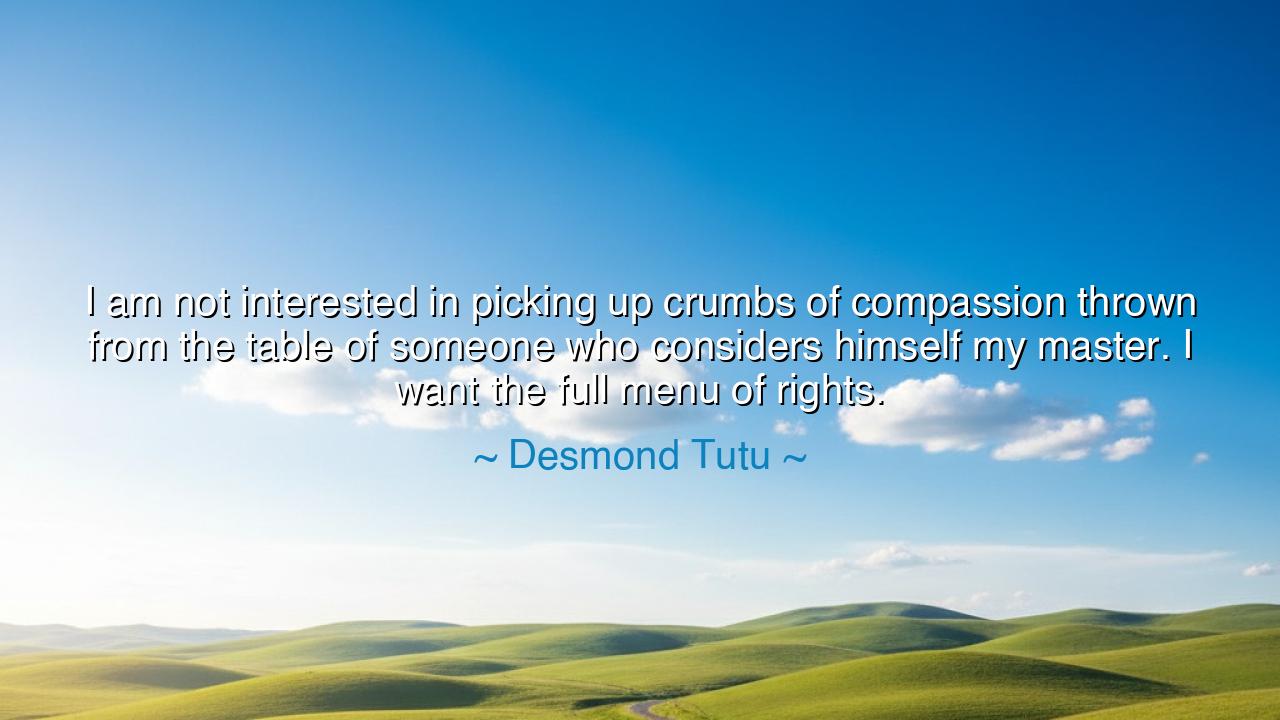
I am not interested in picking up crumbs of compassion thrown
I am not interested in picking up crumbs of compassion thrown from the table of someone who considers himself my master. I want the full menu of rights.






“I am not interested in picking up crumbs of compassion thrown from the table of someone who considers himself my master. I want the full menu of rights.” Thus declared Desmond Tutu, prophet of justice and voice against the chains of apartheid. In these words, he exposes the folly of false charity, the mockery of freedom offered in fragments. To accept mere crumbs is to remain a beggar before the proud. To demand the full menu of rights is to claim one’s humanity in its wholeness, as given not by rulers but by God Himself.
This saying was born in the furnace of South Africa’s oppression. Under apartheid, the rulers boasted of their “compassion,” granting token privileges to those they oppressed, as though a master tossing scraps to a starving servant should be praised for generosity. But Tutu saw through this deceit. Compassion without justice is condescension; mercy without equality is mockery. He knew that the oppressed were not animals to be pacified with crumbs, but men and women, children of God, worthy of the feast of freedom.
The ancients, too, would have understood. For in Rome, when the emperors cast bread to the crowd, they believed they bought loyalty. But the people hungered not only for bread—they hungered for dignity, for justice, for a voice in the fate of their own lives. Bread without freedom is slavery sweetened. Crumbs without rights are shackles gilded. Tutu’s words rise as a trumpet to remind us: true liberty is not granted in fragments, but embraced in fullness.
Consider the story of the American civil rights movement. When Martin Luther King Jr. marched in Birmingham, many counseled patience. “Wait,” they said. “Accept what you have been given, and more will come.” But King, like Tutu, rejected crumbs. He wrote from his jail cell that “justice too long delayed is justice denied.” And when the marchers demanded their full share, when they refused to bow their heads for tokens, the conscience of a nation was shaken awake. The feast of rights could no longer be withheld.
From this truth, a mighty lesson flows: never mistake condescension for justice, nor pity for equality. If a gift is given to keep you in your place, it is no gift at all. The dignity of the human soul demands fullness, not fragments. To settle for crumbs is to betray the sacred fire within; to rise and demand the full menu is to honor the image of the divine stamped upon your being.
Yet Tutu’s words do not call for arrogance, but for courage. To demand rights is not to scorn compassion, but to insist that compassion be joined to justice, that mercy give birth to equality. His voice urges us to rise from the floor where we stoop for scraps, and to sit upright at the table of humanity, not as beggars, but as brothers and sisters, equal in worth.
What, then, must we do? In our own lives, we must refuse to be satisfied with crumbs—crumbs of respect, crumbs of justice, crumbs of love. In the workplace, in society, in the home, let us speak with courage: “I am worthy of the full feast.” And likewise, when we are in positions of power, let us not toss crumbs to those beneath us, but open the table, widen the circle, and invite all to share in its fullness. For justice is not diminished when shared; it multiplies, like bread blessed and broken among the multitude.
So remember the words of Desmond Tutu: “I want the full menu of rights.” Let them burn in your heart as both warning and promise. Warning, that no man should accept less than his God-given dignity. Promise, that when people rise together, refusing crumbs, they will indeed taste the fullness of justice. For the feast of freedom is not for the few—it is for all, and it waits for those who dare to claim their seat.






AAdministratorAdministrator
Welcome, honored guests. Please leave a comment, we will respond soon